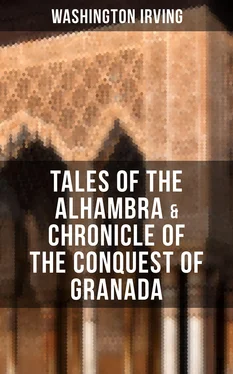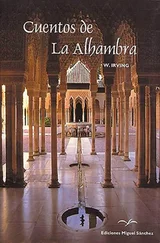These, like most popular fictions, have sprung from some scanty groundwork of fact. During the wars between Moor and Christian which distracted this country for centuries, towns and castles were liable frequently and suddenly to change owners, and the inhabitants, during sieges and assaults, were fain to bury their money and jewels in the earth, or hide them in vaults and wells, as is often done at the present day in the despotic and belligerent countries of the East. At the time of the expulsion of the Moors also, many of them concealed their most precious effects, hoping that their exile would be but temporary, and that they would be enabled to return and retrieve their treasures at some future day. It is certain that from time to time hoards of gold and silver coin have been accidentally digged up, after a lapse of centuries, from among the ruins of Moorish fortresses and habitations; and it requires but a few facts of the kind to give birth to a thousand fictions.
The stories thus originating have generally something of an Oriental tinge, and are marked with that mixture of the Arabic and the Gothic which seems to me to characterize every thing in Spain, and especially in its southern provinces. The hidden wealth is always laid under magic spell, and secured by charm and talisman. Sometimes it is guarded by uncouth monsters or fiery dragons, sometimes by enchanted Moors, who sit by it in armor, with drawn swords, but motionless as statues, maintaining a sleepless watch for ages.
The Alhambra of course, from the peculiar circumstances of its history, is a stronghold for popular fictions of the kind; and various relics, digged up from time to time, have contributed to strengthen them. At one time an earthen vessel was found containing Moorish coins and the skeleton of a cock, which, according to the opinion of certain shrewd inspectors, must have been buried alive. At another time a vessel was dug up containing a great scarabaeus or beetle of baked clay, covered with Arabic inscriptions, which was pronounced a prodigious amulet of occult virtues. In this way the wits of the ragged brood who inhabit the Alhambra have been set wool-gathering, until there is not a hall, nor tower, nor vault, of the old fortress, that has not been made the scene of some marvellous tradition. Having, I trust, in the preceding papers made the reader in some degree familiar with the localities of the Alhambra, I shall now launch out more largely into the wonderful legends connected with it, and which I have diligently wrought into shape and form, from various legendary scraps and hints picked up in the course of my perambulations; in the same manner, that an antiquary works out a regular historical document from a few scattered letters of an almost defaced inscription.
If any thing in these legends should shock the faith of the over-scrupulous reader, he must remember the nature of the place, and make due allowances. He must not expect here the same laws of probability that govern commonplace scenes and everyday life; he must remember that he treads the halls of an enchanted palace, and that all is “haunted ground.”
THE HOUSE OF THE WEATHERCOCK.
Table of Contents
On the brow of the lofty hill of the Albaycin, the highest part of Granada, and which rises from the narrow valley of the Darro, directly opposite to the Alhambra, stands all that is left of what was once a royal palace of the Moors. it has, in fact, fallen into such obscurity, that it cost me much trouble to find it; though aided in my researches, by the sagacious and all-knowing Mateo Ximenes. This edifice has borne for centuries the name of “The House of the Weathercock” (La Casa del Gallo de Viento), from a bronze figure on one of its turrets, in ancient times, of a warrior on horseback, and turning with every breeze. This weathercock was considered by the Moslems of Granada a portentous talisman. According to some traditions, it bore the following Arabic inscription:
Calet et Bedici Aben Habuz, Quidat ehahet Lindabuz.
Which has been rendered into Spanish:
Dice el sabio Aben Habuz, Que asi se defiende el Andaluz.
And into English:
In this way, says, Aben Habuz the wise, Andaluz guards against surprise.
This Aben Habuz, according to some of the old Moorish chronicles, was a captain in the invading army of Taric, one of the conquerors of Spain, who left him as Alcayde of Granada. He is supposed to have intended this effigy as a perpetual warning to the Moslems of Andaluz, that, surrounded by foes, their safety depended upon their being always on their guard and ready for the field.
Others, among whom is the Christian historian Marmol, affirms “Badis Aben Habus” to have been a Moorish sultan of Granada, and that the weathercock was intended as a perpetual admonition of the instability of Moslem power, bearing the following words in Arabic:
“Thus Ibn Habus al Badise predicts Andalus shall one day vanish and pass away.”
Another version of this portentous inscription is given by a Moslem historian, on the authority of Sidi Hasan, a faquir who flourished about the time of Ferdinand and Isabella, and who was present at the taking down of the weathercock, when the old Kassaba was undergoing repairs.
“I saw it,” says the venerable faquir, “with my own eyes; it was of a heptagonal shape, and had the following inscription in verse:
The palace at fair Granada presents a talisman.
The horseman, though a solid body, turns with every wind.
This to a wise man reveals a mystery: In a little while comes a calamity to ruin both the palace and its owner.”
In effect it was not long after this meddling with the portentous weathercock that the following event occurred. As old Muley Abul Hassan, the king of Granada, was seated under a sumptuous pavilion, reviewing his troops who paraded before him in armor of polished steel, and gorgeous silken robes, mounted on fleet steeds, and equipped with swords, spears and shields, embossed with gold and silver; suddenly a tempest was seen hurrying from the southwest. In a little while, black clouds overshadowed the heavens and burst forth with a deluge of rain. Torrents came roaring down from the mountains, bringing with them rocks and trees; the Darro overflowed its banks; mills were swept away; bridges destroyed, gardens laid waste; the inundation rushed into the city, undermining houses, drowning their inhabitants, and overflowing even the square of the Great Mosque. The people rushed in affright to the mosques to implore the mercy of Allah, regarding this uproar of the elements as the harbinger of dreadful calamities; and, indeed, according to the Arabian historian, Al Makkari, it was but a type and prelude of the direful war which ended in the downfall of the Moslem kingdom of Granada.
I have thus given historic authorities, sufficient to show the portentous mysteries connected with the House of the Weathercock, and its talismanic horseman.
I now proceed to relate still more surprising things about Aben Habuz and his palace; for the truth of which, should any doubt be entertained, I refer the dubious reader to Mateo Ximenes and his fellow-historiographers of the Alhambra.
VISITORS TO THE ALHAMBRA.
Table of Contents
For nearly three months had I enjoyed undisturbed my dream of sovereignty in the Alhambra: a longer term of quiet than had been the lot of many of my predecessors. During this lapse of time the progress of the season had wrought the usual change. On my arrival I had found every thing in the freshness of May; the foliage of the trees was still tender and transparent; the pomegranate had not yet shed its brilliant crimson blossoms; the orchards of the Xenil and the Darro were in full bloom; the rocks were hung with wild flowers, and Granada seemed completely surrounded by a wilderness of roses; among which innumerable nightingales sang, not merely in the night, but all day long.
Читать дальше












